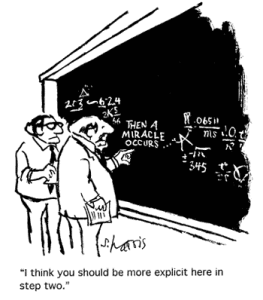 A 2012 study published in the journal Science is making the rounds on the interwebs again. In one part of the study, the researchers suggest that they can predict if someone is religious or an atheist based on how the person answers three mathematical word problems. That sounds fun!
A 2012 study published in the journal Science is making the rounds on the interwebs again. In one part of the study, the researchers suggest that they can predict if someone is religious or an atheist based on how the person answers three mathematical word problems. That sounds fun!
So I had to know, am I an atheist? As it turns out, yes I am. Surprise! Are you an atheist? Let’s find out. According to the recent BigThink.com article, here are the three math questions. Take them and let’s see how you did:
1. A bat and a ball cost $1.10 in total. The bat costs $1.00 more than the ball. How much does the ball cost? ____cents
2. If it takes 5 machines 5 minutes to make 5 widgets, how long would it take 100 machines to make 100 widgets? _____minutes
3. In a lake, there is a patch of lily pads. Every day, the patch doubles in size. If it takes 48 days for the patch to cover the entire lake, how long would it take for the patch to cover half of the lake? _____days
Write your answers down before reading the rest of this blog post. No cheating! That might be another test of religiosity. If you cheat, you are more likely to be religious. I’m just say’n. So write your answers down now.
Okay, done? Good, now you can continue.
There are two sets of answers for each question. The first set of answers are the religious answer and on a totally unrelated strange coincidence, those answers are also the wrong answers. Those answers are 10 cents, 100 minutes, and 24 days.
The second set of answers are the atheist answers. Oddly enough those answers are also the correct answers. In other words they, like atheism, they match up with reality. They are, 5 cents, 5 minutes, and 47 days. If you got those answers, congratulations, you are probably an atheist.
Why is that? Well according to the researchers, atheists tend to be analytic thinkers who actually think about the problems and take time trying to solve them rather than accepting the first answer that comes to mind or picking the answer that looks like it should fit. I’m paraphrasing of course. Apparently, religious believers tend to be more intuitive instead of analytic in their thinking. Or, as Stephen Colbert puts it, they do their thinking with their gut.
Interestingly enough, I wrote about one of the other studies published in this same journal, at this same time, by these same researchers which suggest that just thinking about thinking analytically can make someone less religious.
What do you think of this study? Is it an oversimplification of a more complex issue? Or are these researchers on to something here?
Related articles
- Rise of the ‘New Mathematicians’ (skepticink.com)
- Young atheists: The political leaders of tomorrow (examiner.com)
- Analytic thinking can decrease religious belief (examiner.com)
- The Evidence is in The Stars (skepticink.com)
